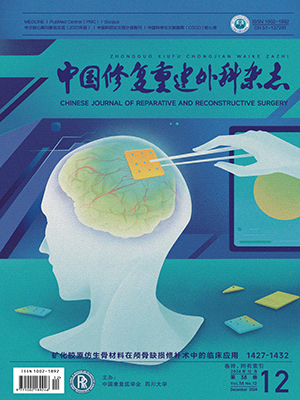Perfusion of free flaps from groin of rabbits, after 12 hours of complete ischemia, with superoxide dismutase (SOD), an oxygen free radical scavenger, would significantly increase the survival rate of these flaps from 18.75% to 75% in the control group. Tissue levels of SOD and malonydialdehyde (MDA, an end product of lipoperoxidation) were measured before ischemia, after ischemia but before reperfusion, and 60 minites after reperfusion. In untreated flap, after 12 hours- ischemia, the SOD content of skin decreased significantly as compared with the SOD content before ischemia, and reperfusion further decreased SOD activity, while the concentration of MDA increased after ischemia and further increased after reperfusion. In the treated flaps, the concentration of SOD was not decrease and MADnot increased after reperfusion. There was a negative correlation between the values of SOD and MDA. These findings suggested that free oxygen radicals playedan important role in the free flap ischemia reperfusion injury. SOD could increase the survival of ischemic free-flaps by reducing lipoperoxidation. The results had significant clinical implications with regard to organ preservation and transplantation.
Citation: Guo Shuzhong,Wang Liangneng,Lu Kaihua.. IMPROVED SURVIVAL OF FREE SKIN FLAPS AFTER PROLONGED ISCHEMIA BY PERFUSION WITH SUPEROXIED DISMUTASE. Chinese Journal of Reparative and Reconstructive Surgery, 1995, 9(2): 104-107. doi: Copy
Copyright © the editorial department of Chinese Journal of Reparative and Reconstructive Surgery of West China Medical Publisher. All rights reserved




